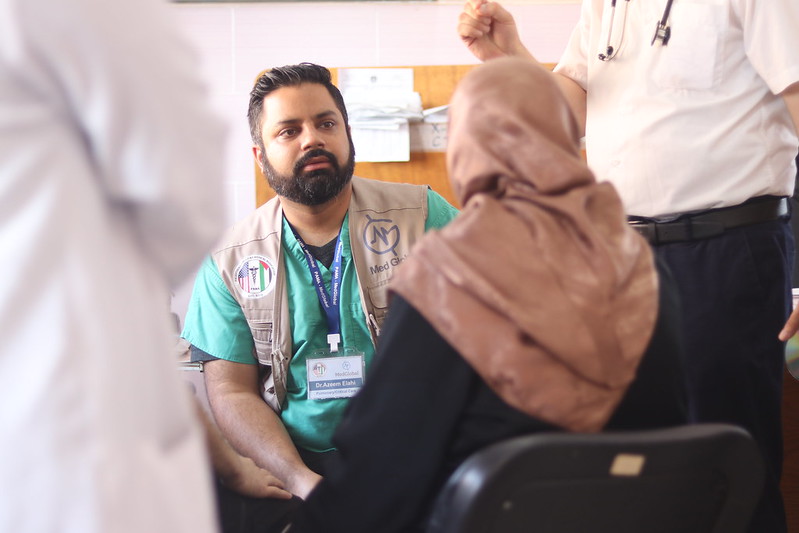Fighting Diseases in Palestine
 Palestine includes two non-contiguous territories located in the Middle East: the Gaza Strip and the West Bank. The West Bank is home to 3.2 million people and Gaza to 2.1 million. Since Oct. 7, 2023, continuous warfare between Israel and the resistance of Palestine has resulted in a severe health crisis, highlighted by a rapid spread of infectious diseases and the collapse of essential health care services.
Palestine includes two non-contiguous territories located in the Middle East: the Gaza Strip and the West Bank. The West Bank is home to 3.2 million people and Gaza to 2.1 million. Since Oct. 7, 2023, continuous warfare between Israel and the resistance of Palestine has resulted in a severe health crisis, highlighted by a rapid spread of infectious diseases and the collapse of essential health care services.
Political and economic instability–worsened by the blockade and fighting– has left the health care infrastructure in shambles, severely impacting the well-being of Palestinians. Both chronic and transferable illnesses, coupled with a rapid decline in mental health, have steadily worsened. However, international and local nongovernmental organizations (NGOs) are working to combat the dire situation.
Crumbling Health Care System
The health care system in Palestine, particularly in Gaza, is on the brink of collapse. The conflict has led to severe shortages of medicines, fuel and medical supplies, making it nearly impossible for hospitals and clinics to function effectively. According to reports, there are around 350,000 patients in Gaza suffering from chronic conditions such as cancer and diabetes, alongside 50,000 pregnant women who are struggling to access necessary care.
The World Health Organization (WHO) has reported that nearly two-thirds of health clinics in Gaza are nonfunctional. Furthermore, the United Nations Relief and Works Agency (UNRWA) for Palestine Refugees in the Near East has indicated that fewer than half of its health centers can offer primary care to patients. This has left a sizable portion of the population without access to basic medical services, exacerbating the health crisis.
Sanitation and Water Crisis
The water and sanitation situation in Palestine is extremely dire. There is only one shower for 4,500 people and one toilet for more than 200 people. This has led to a significant increase in the spread of infectious diseases in Palestine. The situation is a result of the ongoing conflict, which has forced many Palestinians to seek refuge in overcrowded shelters or relocate to the south, where unsanitary conditions prevail.
Contaminated water supply and poor hygiene are leading to outbreaks of illnesses such as diarrhea, respiratory infections and chickenpox. Up to 70 people are crammed into single rooms, creating an environment ripe for disease transmission. Respiratory diseases in Palestine are particularly rampant, with more than 150,000 cases of upper respiratory infections reported, alongside numerous cases of meningitis, skin rashes, lice and chickenpox. The risk of cholera and other epidemics looms large as the health and sanitation infrastructure continues to deteriorate.
Efforts to Combat Disease
Despite the overwhelming challenges, various efforts and initiatives are underway to alleviate the health crisis in Palestine. NGOs are spearheading humanitarian aid to mitigate the ongoing situation.
WHO is improving health conditions by coordinating with local and international partners to enhance aid delivery and establish more supply routes. More than a dozen high-risk operations have been conducted to provide supplies to hospitals in Gaza. WHO helped establish two kitchens at Al-Shifa Hospital, which serve 1,200 meals a day. Its distribution of medical supplies currently supports treatment for 1,250 children with severe malnutrition.
The United Nations Children’s Fund (UNICEF) also plays a pivotal role in saving lives. In addition to first aid, it provides 600,000 vaccinations and nutritional supplements to children and expecting mothers. It also provides safe drinking water for 1.3 million people to curb infectious diseases.
While efforts to provide relief are ongoing, the situation remains precarious. However, the resilience and determination of health care workers combined with international support allow for much optimism. Sustained efforts and global solidarity offer hope in paving the way for a healthier future in Palestine.
– Asiya Siddiqui
Asiya is based in Fremont, CA, USA and focuses on Global Health and Good News for The Borgen Project.
Photo: Flickr
